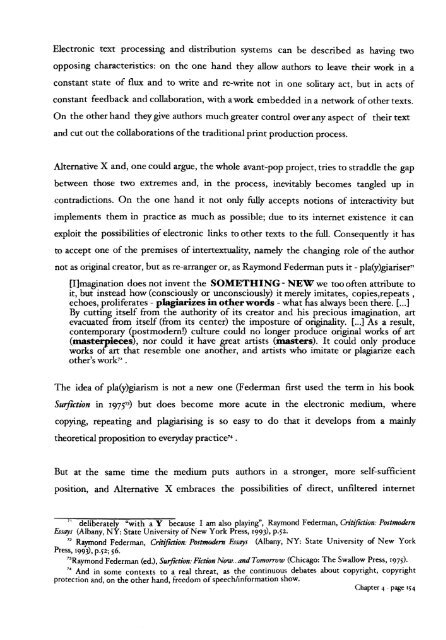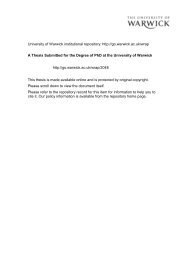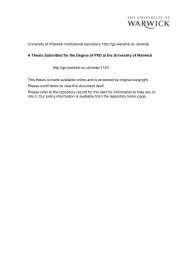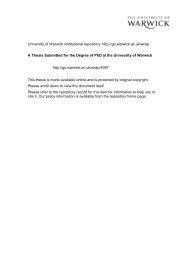From Page to Screen - WRAP: Warwick Research Archive Portal ...
From Page to Screen - WRAP: Warwick Research Archive Portal ...
From Page to Screen - WRAP: Warwick Research Archive Portal ...
Create successful ePaper yourself
Turn your PDF publications into a flip-book with our unique Google optimized e-Paper software.
Electronic text processing and distribution systems can be described as having two<br />
opposing characteristics: on the one hand they allow authors <strong>to</strong> leave their work in a<br />
constant state of flux and <strong>to</strong> write and re-write not in one solitary act, but in acts of<br />
constant feedback and collaboration, with awork embedded in a network ofother texts.<br />
On the other hand theygive authors muchgreater control over any aspect of their text<br />
and cut out the collaborations ofthe traditional print production process.<br />
Alternative X and, one could argue, the whole avant-pop project, tries <strong>to</strong> straddle the gap<br />
between those two extremes and, in the process, inevitably becomes tangled up in<br />
contradictions. On the one hand it not only fully accepts notions of interactivity but<br />
implements them in practice as much as possible; due <strong>to</strong> its internet existence it can<br />
exploit the possibilities of electronic links <strong>to</strong> other texts <strong>to</strong> the full. Consequently it has<br />
<strong>to</strong> accept one of the premises of intertextuality, namely the changing role of the author<br />
not as original crea<strong>to</strong>r, but as re-arranger or, as Raymond Federman puts it - pla(y)giariser 71<br />
{I}magination does not invent the SOMETHING- NEW we <strong>to</strong>o often attribute <strong>to</strong><br />
it, but instead how (consciously or unconsciously) it merely imitates, copies,repeats,<br />
echoes, proliferates - plagiarizes inotherwords - what has always been there. I...}<br />
By cutting itself from the authority of its crea<strong>to</strong>r and his precious imagination, art<br />
evacuated from itself (from its center) the imposture of originality. {...} As a result,<br />
contemporary (postmodern!) culture could no longer produce original works of art<br />
(masterpieces), nor could it have great artists (masters). It could only produce<br />
works orart that resemble one another, and artists who imitate or plagiarize each<br />
other's work" .<br />
The idea of pla(y)giarism is not a new one (Federman first used the term in his book<br />
Surfiction in 197f 3 ) but does become more acute in the electronic medium, where<br />
copying, repeating and plagiarising is so easy <strong>to</strong> do that it develops from a mainly<br />
theoretical proposition <strong>to</strong> everyday practice» .<br />
But at the same time the medium puts authors in a stronger, more self-sufficient<br />
position, and Alternative X embraces the possibilities of direct, unfiltered internet<br />
71 deliberately "with a Y because I am also playing", Raymond Federman, Critifiction: Postmodern<br />
Essays (Albany, NY: State University of New York Press, 1993), p.p.<br />
72 Raymond Federman, Critiftction: Postmodem Essays (Albany, NY: State University of New York<br />
Press, 1993>, p.p; 56.<br />
73Raymond Federman (ed.), Surfiction: Fiction Now ...and Tomorroui (Chicago: The Swallow Press, 1975)·<br />
74 And in some contexts <strong>to</strong> a real threat, as the continuous debates about copyright, copyright<br />
protection and, on the other hand, freedom ofspeech/information show.<br />
Chapter 4 - page 154





